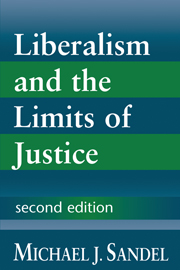Book contents
- Frontmatter
- Contents
- Preface to the Second Edition: The Limits of Communitarianism
- Acknowledgments
- Introduction: Liberalism and the Primacy of Justice
- 1 Justice and the Moral Subject
- 2 Possession, Desert, and Distributive Justice
- 3 Contract Theory and Justification
- 4 Justice and the Good
- Conclusion: Liberalism and the Limits of Justice
- A Response to Rawls' Political Liberalism
- Bibliography
- Index
1 - Justice and the Moral Subject
Published online by Cambridge University Press: 05 June 2012
- Frontmatter
- Contents
- Preface to the Second Edition: The Limits of Communitarianism
- Acknowledgments
- Introduction: Liberalism and the Primacy of Justice
- 1 Justice and the Moral Subject
- 2 Possession, Desert, and Distributive Justice
- 3 Contract Theory and Justification
- 4 Justice and the Good
- Conclusion: Liberalism and the Limits of Justice
- A Response to Rawls' Political Liberalism
- Bibliography
- Index
Summary
Like Kant, Rawls is a deontological liberal. His book takes the main thesis of the deontological ethic as its central claim. That this claim has received little direct discussion in the voluminous critical literature on A Theory of Justice may attest to its fixed place in the moral and political assumptions of the time. It concerns not the principles of justice but the status of justice itself. It is the assertion that both opens the book and concludes it, the core conviction Rawls seeks above all to defend. It is the claim that ‘justice is the first virtue of social institutions’, the single most important consideration in assessing the basic structure of society and the overall direction of social change.
Justice is the first virtue of social institutions, as truth is of systems of thought. A theory however elegant and economical must be rejected or revised if it is untrue; likewise laws and institutions no matter how efficient and well-arranged must be reformed or abolished if they are unjust. … Being first virtues of human activities, truth and justice are uncompromising (3–4).
I have tried to set forth a theory that enables us to understand and to assess these feelings about the primacy of justice. Justice as fairness is the outcome: it articulates these opinions and supports their general tendency (586).
It is this claim for the primacy of justice that I propose to examine.
- Type
- Chapter
- Information
- Liberalism and the Limits of Justice , pp. 15 - 65Publisher: Cambridge University PressPrint publication year: 1998



